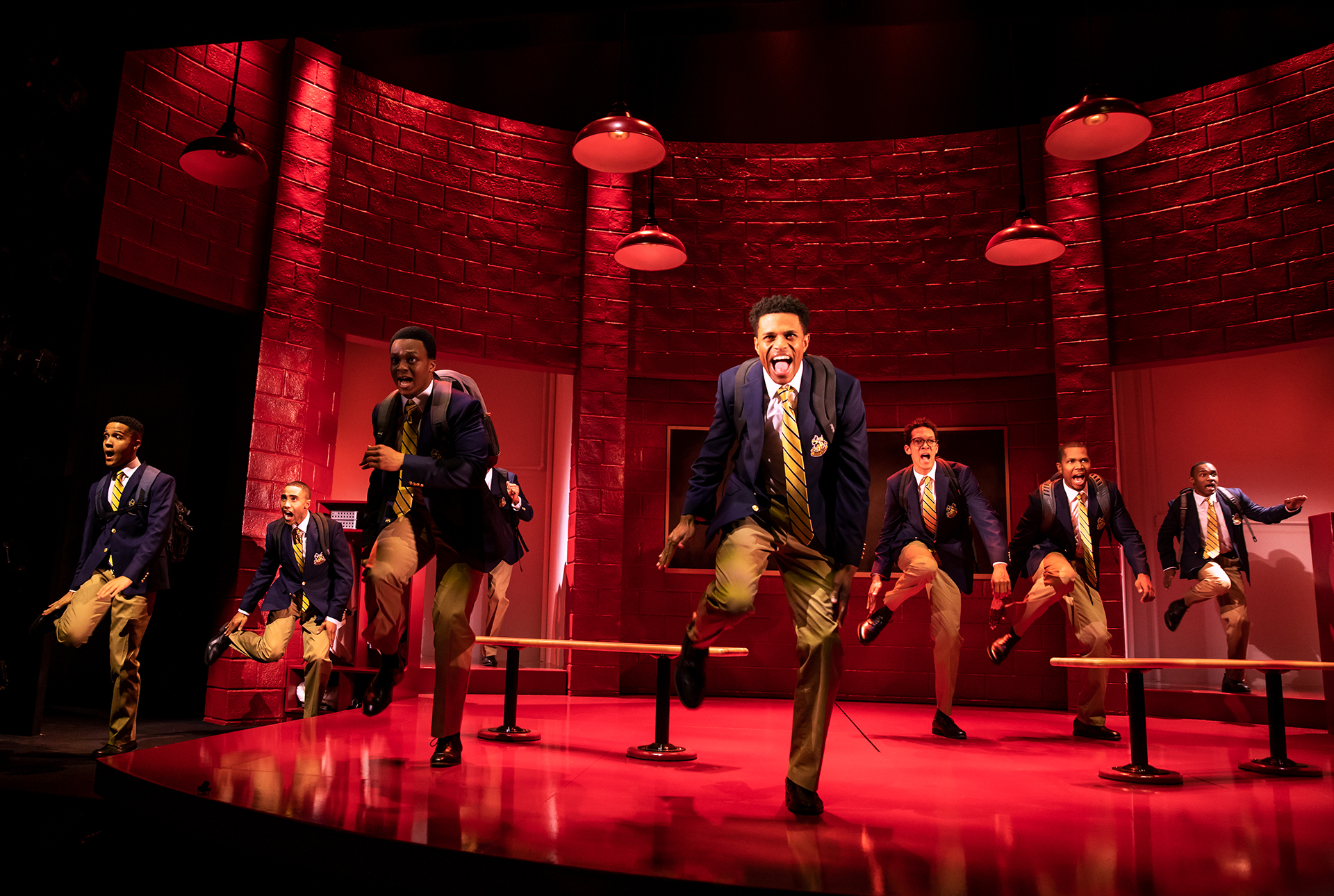‘Choir Boy’ Tackles Racism, Homophobia

There is a lot less violence in Tarell Alvin McCraney’s “Choir Boy” at the Manhattan Theater Club than there is in the Academy Awarding winning movie, adapted from his play, “In Moonlight Black Boys Look Blue.” Still, the stripped-down version of it that we see in this coming-of-age drama equally challenges the way we think.
Its language is that of spirituals, but not just the old standards. In Jason Michael Webb’s arrangements, well-known classics are delivered in a contemporary jazz style. Camille Brown’s choreography is fierce and edgy, in the spirit of Bill Jones’s dances in “Spring Awakening.”
In this production, about teenage boys in an African American boarding school, Chuck Cooper plays Headmaster Marrow, a man of genuine commitment to his students, to their education, and upbringing. Cooper, as we know, has a powerful presence. And by playing the role with directness and simplicity, he musters credibility in spite of the stodgy principles he’s required to espouse.
To his credit, Cooper’s Headmaster is sincerely kind, and necessarily stern. In a school in which privilege, racial strife, and hormones rage, he has a lot on his hands.
Like the central character of “Moonlight,” Pharus Jonathan Young, played by the gifted Jeremy Pope, is gay. And while it wouldn’t be fair to say he’s confused, it’s clear that the world he needs to sort out is a confusing one for any lad. Especially for Jonathan who doesn’t have a family or friends to support him.
What he has, and what he shields himself with, is his love of singing. But other boys have that too, most noticeably, Jonathan’s arch enemy, Bobby (J. Quinton Johnson), the legacy kid, and the headmaster’s nephew. Regardless, the friction he creates with Jonathan — his homophobic name calling and bullying — gives Jonathan, as the leader of the chorus, cause to throw him out of the club. That his decision creates lots of flack is certainly predictable. That he gets away with it, is not.
Sorting out the play’s message, a former teacher, Mr. Pendleton, emerges from retirement to help prepare these young men, for the world. Arriving like a deus ex machina, even the veritable Austin Pendleton, playing himself, cannot achieve harmony between these warring students.
Along with that, the student who actually acts out the violence, on which the plot hangs, is dismissed. To avoid a spoiler alert, it should be clear that the student in question is a sympathetic young man who needs to escape the poverty of his home, along with his abusive father. His act is wrongful, but hardly life threatening. The object lesson is that he’s a liar, lying to himself, as well as to others. And if Headmaster Morrow has a message, it’s to be true to oneself.
That is the beauty of the story, which is neither moralizing nor derogatory about societal norms. It just lays out a situation, and allows us to share what is positively achieved by taking one’s own path.
The gifted ensemble carries the story beautifully, and casually to a positive outcome, “Not to cross some man-made border but to find a place in our hearts that felt like peace.” Director Trip Cullman mines the material with sensitivity.
Maestro
It’s obvious, from the demographic of the audience at The Duke on 42nd Street, that Arturo Toscanini is a name primarily older people recognize. And for those of us who do, “Maestro,” by Eve Wolf, is an evening of live music and WWII history, told in a way that awakens our senses.
Set to an orchestral suite from Ottorino Respighi’s “Antiche Danze ed Arie (Ancient Airs and Dances),” a video projection (David Bengali) of a puppet-like sheet folds and unfolds, swirling infinitely. Meanwhile, the Maestro describes his creative process, about setting music in motion. “I have to think through the components of the work’s structure — the motivic unit within the phrase, the phrase within the period, the period within the section.”
Indeed, the dancing sheet, so to speak, translating the music into a softly flowing image, creates the experience of synesthesia, akin to Basil Twist’s “Symphonie Fantastique.” A series of pastoral and melodic images offer a welcome contrast to the historical footage of invasions, Nazi rallies, and the historical events surrounding Toscanini’s later life.
Set in 1938, the show opens on him, conducting the NBC Symphony Orchestra in a recording of “Aida” — the quintessential war romance. But, the very act of producing this recording, while not explored here, highlights the fact that radio and recorded music had become popular for the first time during WWII.
Indeed, the worldwide distribution of electronic recordings forged a unique relationship between warfare and music. And with centralized production, governments could also control the style of performance and the content. Needless to say, all of this had far reaching effects then.
Here, the works of Wagner and Verdi, among other, mostly Italian composers, are performed by a quintet of piano and strings. Most impressively, Zhenni Li performs the piano with passionate, dramatic sensibility, and Ari Evan plays the cello with clarity and distinction. The violinists, Mari Lee and Henry Wang, and Matthew Cohen, violaist carry the melodies richly. In Act II, a lone trumpet player, Maximilian Morel, arrives for a standup rendition of Gershwin’s “Rhapsody in Blue.”
About Toscanini, the autobiographical play gives context to his career. As the Italian Maestro, John Noble (“Lord of the Rings”) narrates his experience as a world-famous conductor who his thrown out of his beloved Italy for his opposition to Mussolini and the Nazi war effort.
To this end, Noble expresses the characteristic traits of the famous conductor — his passionate temperament, uncompromising standards, and his infatuation with a woman 30 years his junior. He was no angel, and he led a passionate life.
Far from traditional storytelling, the production, helmed by Donald Sanders, invites us to feel the music, the war, the man.



